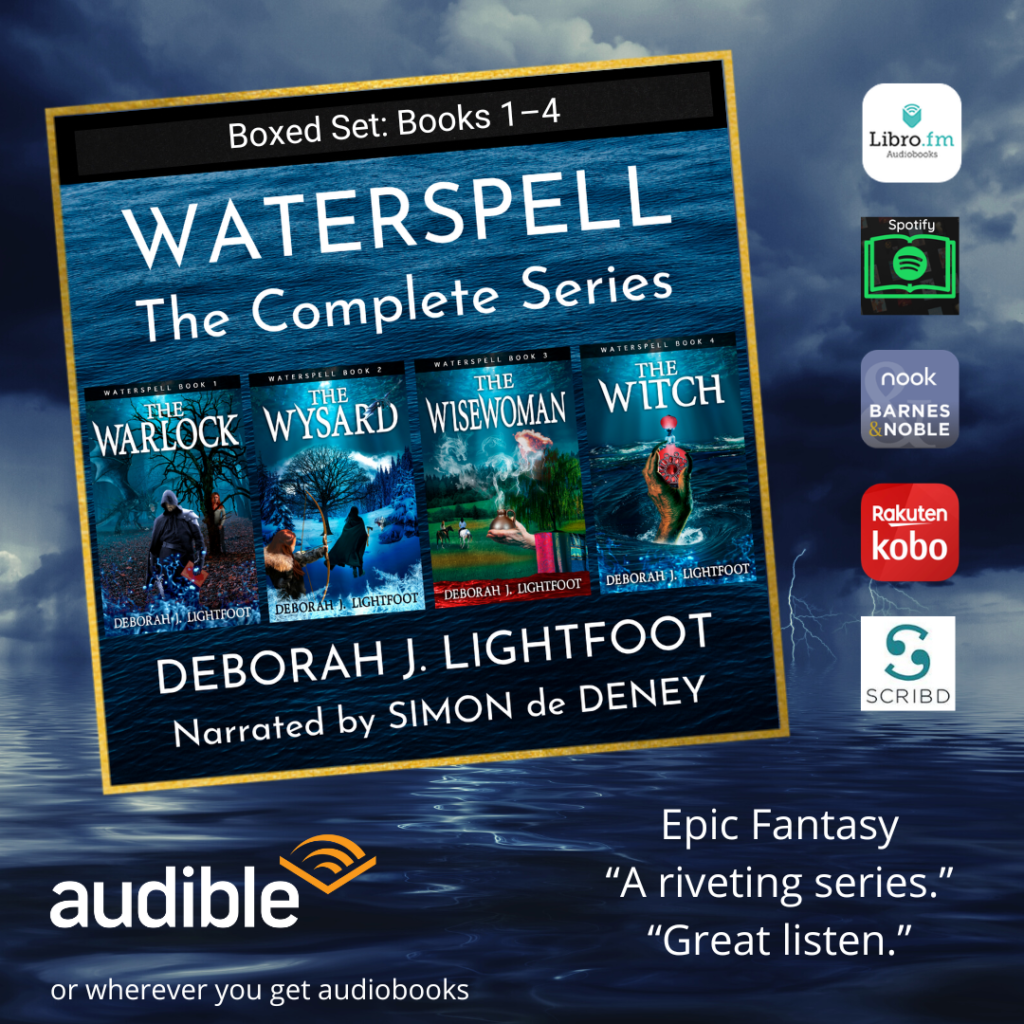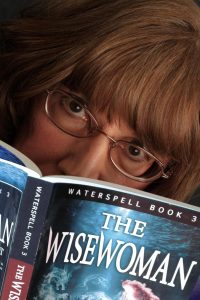“The trick isn’t to get people to read your book. The trick is to get people to hear about your book.”
So said a participant in a recent Authors Guild webinar about book marketing and promotion. The comment struck a chord, for I’ve struggled to get my books more widely noticed. The reviews they have garnered suggest fantasy fans would enjoy reading Waterspell, but too few members of my intended audience have even heard of the series.
Anticipating the release of the audiobooks (which are progressing now, after a six-month hiatus in which Life with a capital L again intervened to back-burner them), I’m trying a mix of old and new ways to reach my audience. My newest effort is through two particularly lively Facebook groups:
- The Reading Corner Book Lounge: “A fun and friendly place for bookdragons to discuss anything and everything bookish! We have a wide variety of members worldwide who read all sorts of genres. We frequently host readathons and have several group reads every month if you choose to participate. We also host author Live interviews a few times a year.”
- Fantasy-Faction – SFF Book Discussion: “Fantasy-Faction.com is one of the world’s largest fantasy and science fiction book communities. Each week we bring readers book reviews, author interviews, articles on the genre, up-to-date news and much, much more. Our site has proudly been nominated for the World and British Fantasy Awards and twice won the Reddit Award for Best Fantasy Website.”
Reading Corner allows authors to self-promote, within limits. Naturally they ask writers to comment and participate with the other posts, and to not join for the sole purpose of self-promotion. I’m enjoying the group immensely and find it easy to participate as simply one avid reader among thousands. Group members read everything, but fantasy is a popular genre among them. The tone is unfailingly supportive and polite. They enjoy each other’s company. I’m not yet ready to straight-out ask for group members to read and review my books, but I anticipate a positive response when I reach that point.
 Fantasy-Faction, on the other hand (the dragon is their logo), does not allow advertising or “buy my book” posts. It’s wonderfully informative, however. I’m learning a new vocabulary for discussing the fantasy genre: terms like “grimdark” and “reactive protagonist.” One post so neatly summed up the elements of classic, epic fantasy, it gave me a kind of template for describing Waterspell’s place in that subgenre:
Fantasy-Faction, on the other hand (the dragon is their logo), does not allow advertising or “buy my book” posts. It’s wonderfully informative, however. I’m learning a new vocabulary for discussing the fantasy genre: terms like “grimdark” and “reactive protagonist.” One post so neatly summed up the elements of classic, epic fantasy, it gave me a kind of template for describing Waterspell’s place in that subgenre:
Waterspell fits firmly in the realm of epic fantasy (but with an environmental fantasy twist) … It’s got ancient and mysterious magic, a Hero/Heroine’s Journey (with a twist), a passage from one world to the otherworld, a (reluctant) Chosen One, and a search for belonging and redemption.
One frequent Fantasy-Faction contributor described her favorite genre tropes in terms that left me in no doubt: She would like Waterspell. Now I’m wondering if it’s cricket (honorable, acceptable, not insectoid) to message her and offer her a review copy in exchange for a fair and honest review. I have to think it over and seek advice. Mustn’t offend (or get kicked out of the group).
New Paperback Covers
 Another thing I’ve learned from participating in these two bookdragon groups is that fantasy fans still buy physical books! I had assumed that ebooks were more popular with my intended audience. Personally, I prefer the convenience and portability of ebooks, and I’ve gradually culled my library of physical books. When I got new ebook (and audiobook) covers made, I thought I wouldn’t bother with updating the paperback covers, too, since the Waterspell paperbacks are much more expensive than the ebooks and haven’t sold as well.
Another thing I’ve learned from participating in these two bookdragon groups is that fantasy fans still buy physical books! I had assumed that ebooks were more popular with my intended audience. Personally, I prefer the convenience and portability of ebooks, and I’ve gradually culled my library of physical books. When I got new ebook (and audiobook) covers made, I thought I wouldn’t bother with updating the paperback covers, too, since the Waterspell paperbacks are much more expensive than the ebooks and haven’t sold as well.
My thinking has changed, after realizing that fantasy fans are collectors as much as they are readers. They love beautiful books, they want to hold them in their hands, and they want to display them on their bookshelves. Therefore, I have returned to my cover artist, Vila Design. and placed an order for new paperback PDFs to match the ebook covers, to be uploaded at Lightning Source.
Tweaked Facebook Page
I had wondered why my books’ Facebook page didn’t look like other writers’ pages. Visitors had to scroll past layers of Facebook-imposed clutter to reach the heart of the page. Finally I dug deep into the Settings (they bury it deep) to discover I was using FB’s “Standard” page template. When I changed to the “Public Figure” template, voila! The page cleaned up nicely. Much less clutter at the top. I’m glad to discover the fix but wonder why it was so hard to find.

And so I press on, trying this and that, seeking a wider audience for my work … convinced, at the end of the day, that nothing really succeeds except word-of-mouth. Personal recommendations are gold.










